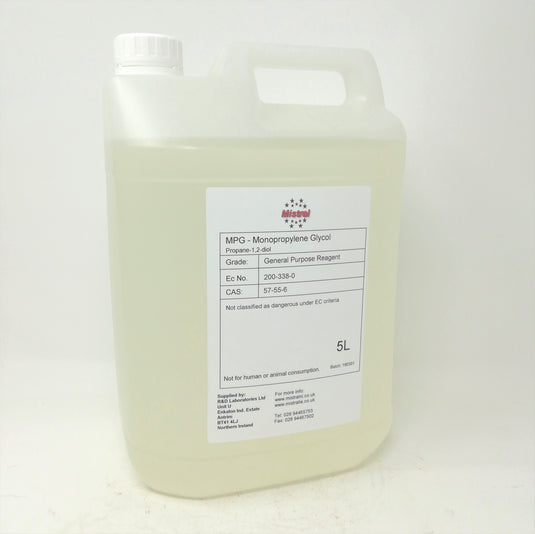PROPYLENE GLYCOL / MPG
MONOPROPYLENE GLYCOL
High Quality / High Purity Grade
Monopropylene Glycol is used for its solvent properties in industry, the personal care market, cosmetic and pharmaceutical industries.
PROPERTIES OF PROPYLENE GLYCOL:
- Chemical Names: Methyl glycol; monopropylene glycol; PG 12; propandiol-1.2; propane-1.2-diol; propylene glycol; trimethyl glycol;
- CAS NO: 57-55-6
- Description: Liquid at room temperature, thick like glycerol, colourless and odourless.
- FORMULA: CH3CH (OH) CH2OH
Cosmetics and Personal Care:
- Moisturizer: Adds moisture to personal care products like lotions, shampoos, ointments, gels and creams.
- Solvent and Carrier: Used in perfumes, deodorants, and other formulations to dissolve ingredients and aid in even application.
- Preservative Booster: Enhances the effectiveness of preservatives in cosmetics.
USES FOR PROPYLENE GLYCOL:
- Making Diffuser oils (see below for details)
- For use in solar boilers / heaters as a heat transfer fluid. To use dilute the propylene glycol 1:1 with water.
- Non-toxic antifreeze and coolant for engines.
- Substitute for ethylene glycol and glycerol.
- A lubricant and antifreeze for hydraulic and brake systems.
- Monopropylene Glycol is used in the manufacture of synthetic alkyd resins found in paints, enamels and varnishes.
- Propylene glycol is used in making polyester compounds and as a solvent in the paint and plastics industries.
- As a solvent for dyes, resins and inks used in high speed printing presses.
- It is used to create artificial smoke or fog for theatrical uses.
- To regulate humidity in a cigar humidor.
- As a carrier for fragrance oils.
- As a coolant in liquid cooling systems.
- MPG is used as a coolant in ice skating rinks.
- Dehydrating fluid for use in the natural gas processing industry.
- In the manufacture of paintballs.
- As a solvent in photographic chemicals like film developers.
PLEASE NOTE: This product is not for human or animal consumption.
How to use propylene glycol to make a lava lamp:
The original formula for making lava lamps recommends using propylene glycol at a ratio of 30:70 with water. The lava is simply a mineral oil which floats through the glycol solution after being heated with a 40W bulb
How to make your own DIFFUSER OIL:
- 10-20% Fragrance oil
- 60-70% DiPropylene glycol or MonoPropylene glycol
- 10-20% Perfumers alcohol
To make diffuser oil, blend the fragrance oil with the DPG or MPG until clear. Add Perfumers alcohol to reduce viscosity to desired thickness.
To read an article on how to make your own Reed Diffuser click here
DEPRESSION OF FREEZING POINT OF WATER:
Propylene glycol is a component in newer automotive antifreezes and de-icers used at airports. Like ethylene glycol (MEG), the freezing point of propylene glycol is depressed when mixed with water due to disruption of hydrogen bonding. Unlike ethylene glycol, propylene glycol is much lower in toxicity. It is readily biodegradable.
Freezing Points of Propylene Glycol / Water Mixtures Percent
| Propylene Glycol (wt. %) | Freezing Point (F) | Freezing Point (C) |
|---|---|---|
| 0 | 32 | 0 |
| 10 | 26 | -3 |
| 20 | 20 | -7 |
| 30 | 10 | -12 |
| 36 | 0 | -18 |
| 40 | -5 | -20 |
| 43 | -10 | -23 |
| 48 | -20 | -29 |
| 52 | -30 | -34 |
| 55 | -40 | -40 |
| 58 | -50 | -46 |
| 60 | -60 | -51 |
Health & safety
Not a hazardous substance or mixture according to EC-directives 67/548/EEC or 1999/45/EC.
Click here to view sales specification sheet
